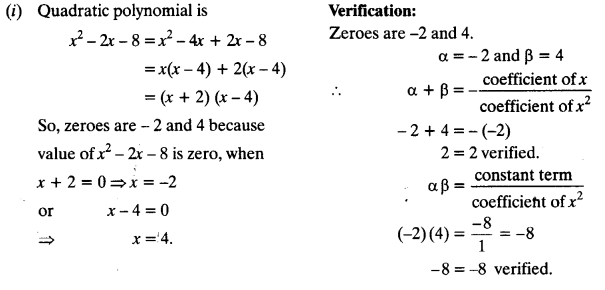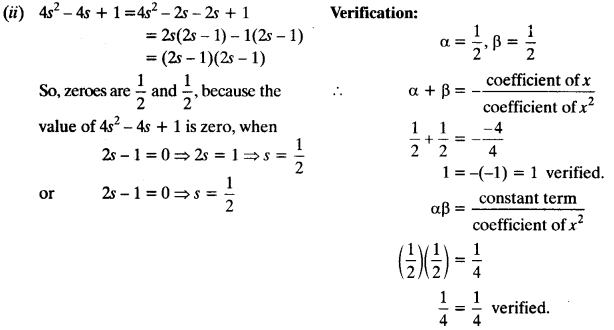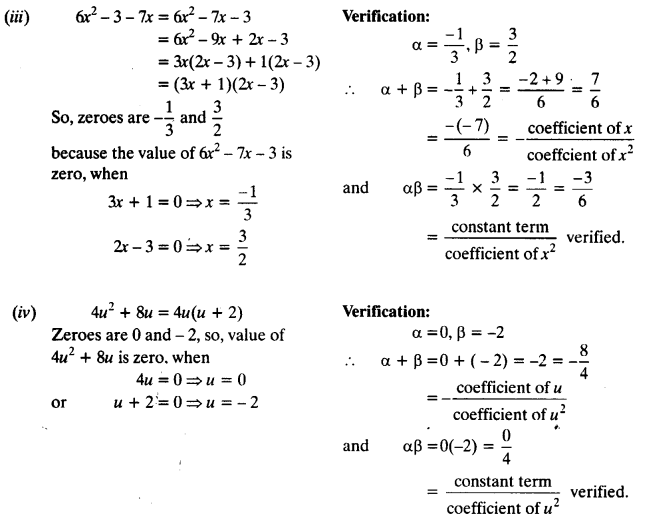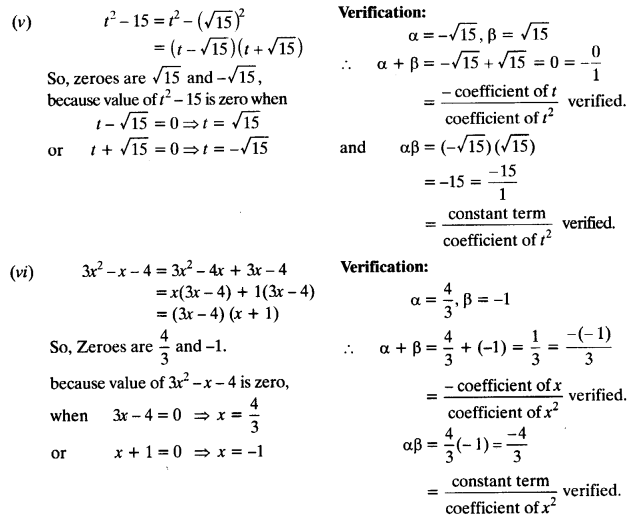EXERCISE 2.2
1) Find the zeroes of the following quadratic polynomials and verify the relationship between the zeroes and the coefficients.
(i) x2 – 2x – 8
(ii) 4s2 – 4s + 1
(iii) 6x2 – 3 – 7x
(iv) 4u2 + 8u
(v) t2 −15
(vi) 3x2 – x – 4
Solution:




2) Find a quadratic polynomial each with the given numbers as the sum and product of its zeroes respectively.
(i) 1/4, −1 (ii) √2, 1/3 (iii) 0,√5 (iv) 1,1 (v) −1/4, 1/4 (vi) 4, 1.
Solution:
(i) Zeroes of polynomial are not given, sum of zeroes = 1/4 and product of zeroes = −1
If ax2 + bx + c is a quadratic polynomial, then
α + β = sum of zeroes = −b/a = 1/4 and αβ = product of zeroes = c/a = −1
Quadratic polynomial is ax2 + bx + c
Let a = k, ∴ b = −k/4 and c = −k
Putting these values, we get
![]()
For different real values of k, we can have quadratic polynomials all having sum of zeroes as 14 and product of zeroes as −1.
(ii) Sum of zeroes = α + β = √2 = −b/a; product of zeroes = αβ = 1/3 = c/a
Quadratic polynomial is ax2 + bx + c
Let a = k, b = −√2/k and c = k/3
Putting these values we get

For all different real values of k, we can have different quadratic polynomials of the form 3x² – 3√2x +1 having sum of zeroes = √2 and product of zeroes =1/3
(iii) Sum of zeroes = α + β = 0 = −b/a; product of zeroes = αβ = √5 = c/a
Let quadratic polynomial is ax2 + bx + c
Let a = k, b = 0, c = √5 k
Putting these values, we get
k [x2 – 0x + √5 ] = k (x2 + √5).
For different real values of k, we can have different quadratic polynomials of the form
x2 + √5, having sum of zeroes = 0 and product of zeroes = √5
(iv) Sum of zeroes = α + β = 1= −b/a; product of zeroes = αβ = 1 = c/a
Let quadratic polynomial is ax2 + bx + c.
Let a = k, c = k, b = −k
Putting these values, we get k [x2 −x +1]
Quadratic polynomial is of the form x2 −x + 1 for different values of k.
(v) Sum of zeroes = α + β = −1/4 = −b/a; product of zeroes = αβ = 1/4 = c/a
Let quadratic polynomial is ax2 + bx + c
Let a= k, b = k/4, c = k/4
Putting these values, we get k
![]()
Quadratic polynomial is of the form 4x2 +x + 1 for different values of k.
(vi) Sum of zeroes = α + β = 4 = −b/a; product of zeroes = αβ = 1 = c/a
Let quadratic polynomial is ax2 + bx + c
Let a = k, b = −4/k and c = k
Putting these values, we get
k [x2 – 4x + 1]
Quadratic polynomial is of the form x2 – 4x + 1 for different values of k.
